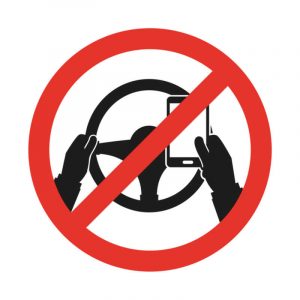“This year will be the summer of the road trip,” said Aldo Vazquez, public relations spokesman for AAA. With trends showing that travel by planes, trains, ships and buses will decrease, the favored mode of transportation for travelers this summer will be by car.
July and August are two of the deadliest months for summer travel with more car crashes and vehicular-related deaths and injuries than an y other months. This is due in part that summertime roads are more congested. All those vacationers have to get to their destinations and most of them will drive. The nice weather also means more bicyclists and pedestrians will be sharing the roads with cars. More people on the roads equates to more chances for something to go wrong. The fact that the use of handheld technological devices leading to distracted driving has also increased during the past decade. The CDC estimates that 8 people will be killed every day due to distracted driving; over 1000 more will be injured.
For us at Bassler & Co. Insurance, auto safety is a top priority so we put together the following list of summer driving tips to help keep you and your family prepared and safe for your summer road trip.
Before You Go
Stock Your Vehicle
Even a well-maintained vehicle can break down, so it’s advisable to put together an emergency roadside kit to carry with you. A cell phone tops the list of suggested emergency kit contents since it allows you to call for help when and where you need it. Suggested emergency roadside kit contents include:
- Cell phone and charger
- First aid kit
- Flashlight
- Flares and a white flag
- Jumper cables
- Tire pressure gauge
- Jack (and ground mat) for changing a tire
- Work gloves and a change of clothes
- Basic repair tools and some duct tape (for temporarily repairing a hose leak)
- Water and paper towels for cleaning up
- Nonperishable food, drinking water, and medicines
- Extra windshield washer fluid
- Maps
- Emergency blankets, towels and coats
Check for Recalls
Owners may not always know that their vehicle has been recalled and needs to be repaired. NHTSA’s VIN lookup tool lets you enter a Vehicle Identification Number (VIN) to quickly learn if a specific vehicle has not been repaired as part of a safety recall in the last 15 years. Check for recalls on your vehicle by searching now: NHTSA.gov/Recalls.
Get Your Car Serviced
Regular maintenance such as tune-ups, oil changes, battery checks, and tire rotations go a long way toward preventing breakdowns. If your vehicle has been serviced according to the manufacturer’s recommendations, it should be in good condition to travel. If not—or you don’t know the service history of the vehicle you plan to drive—schedule a preventive maintenance checkup with your mechanic right away.
Know Your Car
Read your vehicle’s manual to familiarize yourself with the features on your vehicle — such as antilock brakes and electronic stability control — and how the features perform in wintry conditions. When renting a car, become familiar with the vehicle before driving it off the lot.
Plan Your Travel and Route
Before heading out, make sure to check the weather, road conditions, and traffic. Don’t rush through your trip, and allow plenty of time to get to your destination safely. And always familiarize yourself with directions and maps before you go, even if you use a GPS system, and let others know your route and anticipated arrival time.
When You’re on the Road
Stay Alert
Keep your gas tank close to full whenever possible, and, on longer trips, plan enough time to stop to stretch, get something to eat, return calls or text messages, and change drivers or rest if you feel drowsy.
 Avoid Risky Behaviors
Avoid Risky Behaviors
You know the rules: Do not text or drive distracted; obey posted speed limits; and always drive sober. Both alcohol and drugs whether legal or illicit can cause impairment. It is illegal to drive impaired by any substance in all states – no exceptions. Alcohol and drugs can impair the skills critical for safe and responsible driving such as coordination, judgment, perception, and reaction time.
Forego sending texts or checking messages when you’re behind the wheel, for starters. Talk to your teenagers about the risks of distracted driving.

- Make sure to wear safety belts (a high number of car crash fatalities are still related to a lack of seat belt use).
- Be more careful if you’re driving on weekends or in the early evening on most days. Data from NHSTA suggests that Saturdays are the deadliest day of the week and the hour between 6pm – 7pm has more crashes than any other time of day.
- If it’s raining, slow down and watch out for hydroplaning. We’re all hyper vigilant in the winter months about snow and ice, but wet roads can be equally dangerous. Just because it’s warm out, doesn’t mean that the roads are always “safe.”
 We can’t always protect ourselves from other drivers, but what we can do is try to make the roads a little safer by being more mindful drivers ourselves. Watch these 5 safety tips from Carfax for safe driving this summer. Bassler & Co. Insurance is an independent insurance agent located in Northbrook, IL. We can provide coverage from many insurance carriers so you receive the auto insurance for your budget and needs. You can reach us at (847) 480-0800 or online at http://www.basslerins.com/.
We can’t always protect ourselves from other drivers, but what we can do is try to make the roads a little safer by being more mindful drivers ourselves. Watch these 5 safety tips from Carfax for safe driving this summer. Bassler & Co. Insurance is an independent insurance agent located in Northbrook, IL. We can provide coverage from many insurance carriers so you receive the auto insurance for your budget and needs. You can reach us at (847) 480-0800 or online at http://www.basslerins.com/.
Source: https://www.nhtsa.gov/summer-driving-tips-2020 and https://www.huffpost.com/entry/the-dangers-of-summer-dri_b_10232576
